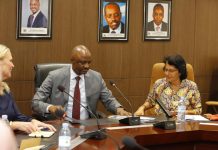By David Mwanje
Bugema University launched its new Alumni Association with a lively ceremony, reconnecting with over 80000 former students after years of inactivity. The event, held on the university’s 640-acre campus 33 kilometers northeast of Kampala, was filled with cheers and heartfelt reunions. The new leadership promised to use global connections, to boost Bugema’s growth as a leading Seventh-day Adventist institution in East Africa.
Leading this revival is Vice Chancellor Pr Dr Israel Kafeero Matsiko Kuwaguza, a Bugema alumnus who took office in 2023. He made rebuilding the alumni network a key goal. “This organization is very important,” Kafeero said in an interview, highlighting its role under the National Council for Higher Education and the Adventist Church. His passion, shaped by years as a lecturer and leader in theology, has turned a once-inactive network into a vibrant force for progress.
The journey began earlier this year with a series of alumni assemblies, drawing graduates from across the region. An interim committee emerged from these forums, paving the way for an electoral commission that orchestrated a transparent general election. Candidates vied for pivotal roles president, vice president, general secretary, finance secretary, publicity secretary, and committee member culminating in Tuesday’s swearing-in. The new cabinet, exuding fresh energy, assumed office amid applause, poised to mobilize the diaspora that includes more than 80% of Kenya’s Seventh-day Adventist pastors, many of whom trace their roots to Bugema’s theology halls.
Kafeero, undeterred by skeptics questioning the timing, dismissed notions of lateness. “It is not late. It has been there before,” he said, acknowledging past “ills” like administrative hiccups and inactivity. “We feel that the new leadership of the university together with this alumni, we are going to move together.” What sets Bugema’s alumni apart, he argued, is its international DNA. With over 1,200 pastors in training from beyond Uganda’s borders, the association isn’t just local it’s a bridge to a worldwide web of influence. “That niche of having people coming from outside, the international exposure, going outside and mobilizing from outside there, I think it’s going to make this university great.”
The university’s commitment underscores a symbiotic partnership. “We are going to support you,” Kafeero pledged, revealing that alumni funds already sit in dedicated accounts, free from institutional meddling. Bugema offers land for development envisioning hostels and offices akin to those on peer campuses and promises facilities to fuel mobilization efforts.
On independence, he was unequivocal âThey are independent in the fact that they have their own government. They have their own office. They have their own bank accounts.” As patron and alumnus, Kafeero envisions collaboration, not control. “As they plan, we plan the university will sanction them and they move on.”
This revival coincides with Bugema’s broader renaissance, blending faith-based education with cutting-edge innovation. The institution, founded in 1948 as a missionary training school and chartered in 1994, now boasts an 82% acceptance rate and ranks highly in Uganda. New offerings include a diploma in clinical medicine and a bachelor’s in public health, alongside thriving programs in nursing, software engineering, Journalism and agriculture. Enrollment surges reflect their appeal, but Bugema’s crown jewel is its pioneering hospital the only in Uganda specializing in lymphedema treatment, known locally as “Njovu” or elephantiasis.
Annually, two medical camps draw patients from across Africa, with the next slated for October. “We have the only hospital that treats those people,” Kafeero noted, crediting partnerships with Germany’s Deggendorf Institute and Lymphverein. Professors from abroad perform surgeries, while student exchanges foster cross-cultural learningâUgandan scholars mastering German for stints overseas, and vice versa. “This is exciting because when you have this student exchange, there’s a lot of interaction,” he said. Recent camps in Bugema and Kamwenge districts treated hundreds, addressing neglected tropical diseases amid rural healthcare gaps and more science courses, expanded intakes.
For alumni, these initiatives offer a clarion call return, contribute, and co-create. Pr Mugweri Junior the newly elected President of the Association on behalf of his Council highlighted during the ceremony, “We’re not just graduates; we’re guardians of a legacy.” Bugema’s story is one of resilience from its turbulent relocation during Idi Amin’s era to today’s global outreach. With the alumni now empowered, the university eyes exponential growth in all aspects.
In Kafeero’s words, “We are glad that today we have sworn in this new cabinet, and we’re sure that they’re going to team up together. to support the development of this university.” As Bugema alumni scatter to pulpits, clinics, and code labs worldwide, their reunion signals a new era one where yesterday’s students become tomorrow’s architects of change.























